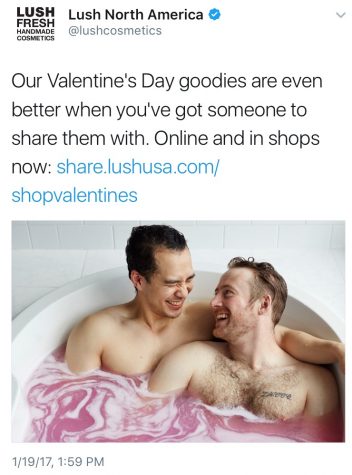Valentine’s Day: celebrate love, not heteronormativity
Valentine’s Day. For those in a relationship, it’s the epitome of romance. For those that are single, it’s another great night to watch Netflix at home. Yet there’s another powerful presence that simply thrives off of this holiday: consumer corporations.
Jewelry stores and flower shops alike testify that Valentine’s Day brings in major cash flow–and for them, that is most certainly a lot of love. Seeing a blushing teenage girl giving her boyfriend a bouquet of flowers on television or a man clasping a heart-shaped gold necklace around his wife’s neck draws romantic sighs from viewers and, if these advertisements are truly successful, credit card numbers as well.
However, these same love-inducing commercials create feelings of annoyance and alienation for other would-be consumers.

LUSH released two Valentine’s Day advertisements featuring same-sex couples, one of which is pictured here.
With the recent increase in acceptance of members of the LGBT community, not to mention the legalization of same-sex marriage, many are quick to wave the progressive banner of “love is love.” So, on a holiday celebrating love itself, where is the marketing geared towards lovers of the same sex?
Big businesses that make a killing on V-Day, such as Tiffany & Co. and Kay Jewelers, don’t feature any same-sex couples in their advertisements, although they do take the time to feature a random dog in their lovey-dovey jewelry commercials. News flash: LGBT people will pay for jewelry, dogs won’t.
Even Hallmark, a greeting cards giant, sells just one Valentine’s Day card created specifically with a homosexual couple in mind. That’s not to overlook the abundant selection of gender neutral cards; however, the sea of “for my husband from a loving wife” cards lining the walls of every drug store once February rolls around is uncomfortable nonetheless.
Incorporating a same-sex couple into Valentine’s Day advertisements won’t take an inordinate amount of extra effort; if a perfume company can pay $33 million for a commercial, swapping out a wife for another husband is child’s play. Some companies such as LUSH Cosmetics have already included same-sex couples in their Valentine’s Day ads, and the positive feedback has been overwhelming. How can more business be a bad thing?
Yes, there’s always the age-old religious argument against support of same-sex marriage which would negate any need for more inclusive advertising. But Valentine’s Day is about love, and enforcing society’s already suffocating heteronormativity is the opposite of that. So whether you focus on the financial aspect or, more importantly, the emotional responses tied with a change in advertising tactics, the choice is clear: inclusiveness is worth the effort.
Because at the end of the day, Valentine’s Day celebrates everyone’s love–not just the love of those that society chooses to accept.







![The Solon Girls Golf Team played at the Tanglewood Club at the District Tournament. The course was quite difficult, said coach Damien Kopkas.
“[The course] got a little narrow in spots, certain holes were a little tighter and tree lined," Kopkas said. "There was a lot of elevation changes, so a lot of walking down hills and having to adjust, playing different shots, using different clubs based on whether it was an uphill or a downhill shot."
Image illustrated by Halina Vitkouskaya.](https://theSHSCourier.com/wp-content/uploads/2025/10/unnamed-2025-10-14T105212.017.jpg)



Ashley Jones • Mar 1, 2017 at 10:32 am
Why are people so intolerant??? All straight advertising is ridiculous!
LOVE is the key!
-ash <3
Rochelle • Feb 13, 2017 at 9:04 am
Many valentine cards are generic and can be sent to whoever your Valentine is!